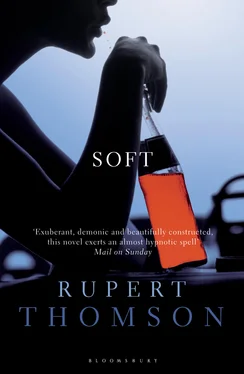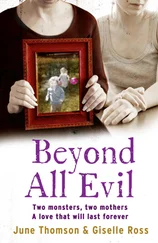She woke up. At first she couldn’t tell whether it was night or day; she had the feeling she might be trapped somewhere in between. She realised she was staring at a concrete pillar. She looked round. They were in the car-park under the hotel. The headlights were still on. Tom was asleep beside her, his head resting against the back of the seat. She sat still, like a person who’s just had an accident, trying to work out how she felt, if she was hurt. Both her knees were burned, and Tom’s stuff had trickled out of her, on to the back of her dress. Her hair had dried and stiffened. She had no knickers on. She didn’t feel too bad, though, considering, and it was cool in the car-park, with a smell of cement which she found soothing. It occurred to her that she was probably still drunk, and that her hangover hadn’t started yet — or perhaps, in being sick, she’d already rid her body of the poison. She reached across and turned the headlights off, and then sat back. She wondered if they were going to miss the wedding. Tom’s eyes opened, closed. Opened again. He asked her what the time was. She had no way of telling; she didn’t wear a watch. He slowly lifted his right wrist and peered at it. Twenty to seven.
‘Ah Jesus,’ he muttered.
She tried to remember the drive back to the hotel, but it was all a blank. She couldn’t even remember the car starting. She supposed it must have been late by the time they left. Three, at least. When she thought of the house on Chestnut Street, with its ancient flaking mirrors and its big dim rooms, it seemed as if she had spent a century there.
‘Who is Sterling?’ she asked.
Tom had closed his eyes again, though she didn’t think he was asleep. Since he wasn’t going to answer, she answered for him.
‘Oh, I don’t know,’ she murmured, ‘just a friend.’
She opened the car door and stepped out. She walked a few yards, the click of her shoes echoing against the wall to her left. Her legs didn’t feel too steady. She looked down at her knees. The burns were maroon, with slightly raised black edges. Rothko, she thought, and almost laughed out loud. Then she thought of the dress she had bought for the wedding, and how its skirt only came to halfway down her thighs (Tom liked to see her legs). She doubted whether she would be able to wear it now. She’d have to improvise.
Tom was staring straight ahead, through the windscreen, one hand clutching the buckle of his seat-belt. His eyes looked as if they’d rusted solid in their sockets.
‘I’m going to bed,’ he said.
Slowly, he hauled himself out of the car and began to walk towards the lift. She followed him. He moved awkwardly, like someone with an injury. Looking back over her shoulder, she noticed that she’d forgotten to shut her door — though, with a convertible, she couldn’t really see what difference it would make.
Upstairs, in the room, Tom took off everything except his boxer shorts and climbed into the bed. Almost as soon as he lay down, he was asleep, his face turned away from her, the shape of his body impersonal, anonymous. Standing by the TV, she watched him for a few minutes, listened to his breathing. Then she walked into the bathroom and closed the door.
It was a spacious bathroom, with a pale-blue carpet, pale-blue walls. A mini-chandelier hung from the ceiling. Lots of mock-gold metalwork and dangling, pear-shaped glass. Against one wall stood a cane sofa heaped with cushions. Against another, a dressing-table, its mirror framed by naked bulbs. She sat on the edge of the bath and turned on the taps. There was no sound in the world she liked better than the sound of running water. She noticed a tall, thin window to the left of the dressing-table, its glass frosted and opaque. Curious, she reached across and opened it.
She was high up, looking out over the city — a view of TV aerials, helicopters, hot polluted sky. The new day glittered and roared fifteen or twenty floors below. To her right, in the distance, she could see a bridge, its latticework of struts and girders arching into the haze. On top of many of the buildings there were rust-coloured huts with pointed roofs. They stood on stilts, and had no doors or windows. She supposed they must be something to do with the water system. Or air-conditioning. Between two glass buildings she could see the Mississippi, a dull blue-grey, the colour of the overcoat that Charlie always wore. Stepping away from the window, she moved back into the middle of the room, unbuttoned her dress and let it fall away. She stood in front of the dressing-table mirror, studying herself. With her two grazed knees, she looked like somebody who prayed too much. She wondered where her knickers were. On the floor of the car, maybe, beneath the glove compartment. Or outside Sterling’s house, on Chestnut Street.
She lay in the hot water, her left hand on her belly. Her knees had stung at first, bringing tears to her eyes, but now she could hardly feel them at all; her limbs floated beneath the surface, weightless, almost numb. She was reminded of the two days she had spent in the sleep laboratory. On the first evening a nurse had fastened a yellow rubber tag around her wrist. Spencer, Glade , it said. 00153 . ‘Your hospital number,’ the nurse informed her, smiling. Glade lay still, staring at the tag. She remembered feeling valuable, important. Safe.
She had arrived at the clinic at four o’clock that afternoon. In reception she was handed several forms with the heading SLEEP STUDY ADMISSION FOR 48 HOURS. She had to give details of her medical history, including previous illnesses and current allergies. One of the forms was interested in what it refered to as ‘daytime somnolence’. The questions amused her. If she was ‘sitting and talking to someone’, for instance, how likely was she to fall asleep? She wanted to write ‘Depends who it is’ — but she had to answer seriously, on a scale of 0–3, 0 being ‘would never doze’, 3 being ‘ high chance of dozing’. When she had completed all the forms, she was asked to sign a disclaimer, which freed the clinic of any liability. The document was a formality, the nurse assured her; the law required it. Still, it worried Glade for a moment, the sight of that dotted line. Then she remembered Charlie telling her no harm would come to her. She picked up the pen and, bending over the paper, wrote her name.
Afterwards, she was shown into a room where her blood pressure, her pulse rate and her temperature were checked. Once that was over, she was taken to a ward that had been divided into cubicles, each cubicle with its curtains drawn, for privacy. All her anxiety lifted. It seemed like a kind of paradise to her, room after room of people sleeping at five in the afternoon. She had a single bed with a painted iron frame and a small clothes-locker that doubled as a bedside table. On the wall above the bed was an adjustable reading-lamp and a panel of power-points. Her window looked into a tall, grim courtyard, a kind of air-shaft. She could see rows of windows identical to hers and, higher up, stretched against the sky, a net to keep the pigeons out. She lay in bed and waited. At six o’clock she was given a meal on a tray, the food packed in silver containers with lids of white card, like an Indian take-away.
After that, it was surprising how little she could remember.
Once, she woke to see two men standing in the doorway to her cubicle, one with light-brown hair, about forty years old, the other older, completely bald. They seemed startled when she opened her eyes, almost frightened, the bald man stepping backwards, into the ward. They must be sleep researchers, she thought. She noticed there were wires attached to her, electrodes, just as Charlie had described. On the admission form, in the box marked ARRANGEMENTS FOR DISCHARGE, she had nominated Charlie Moore as her escort, if she should need one. Everything was taken care of. She sighed and closed her eyes and drifted back to sleep.
Читать дальше












